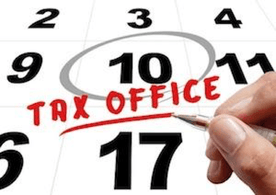 Whether you have owned your small business for several years or are new to the game, there are some things you can do to simplify tax season and make the tax-filing process more manageable. From tips for improving your recordkeeping processes to maximizing your deductions, this guide will be your go-to resource when tax season arrives. Do not wait for tax season to arrive One of the main reasons that small business owners dread the tax-filing process is that they do not prepare for tax season year-round. Waiting until after the first of the year to gather together receipts, invoices, tax forms, and other documents is not a good idea because you are more likely to overlook or misplace an important piece of your tax files in your haste to meet the filing deadline. It is much better for small business owners to have a consistent filing process for tax records and documents. For example, dedicate a filing cabinet drawer to your tax records and documents. Make separate files for employee expenses, utility costs, office supplies, equipment and furniture purchases, lunch meetings, etc. You should also have separate files for your W-2 and 1099 forms (w-2 software and 1099 software programs don’t hurt either) because documents and records vary significantly. Pay as you go Small business owners should be filing quarterly taxes and making estimated tax payments or withholdings throughout the year. This way, you are keeping up with your records and expenses more accurately, and you won’t have to pay the IRS a giant lump sum at the end of the year. Keep in mind that the filing schedule varies depending on the type of business you own, and that you must be withholding federal income taxes, social security and Medicare taxes, and unemployment taxes from employees throughout the year as well. You also should be keeping track of all independent contractors or freelancers who work for you throughout the year, too. Any of these workers that you pay more than $600 in one year must be reported to the IRS with a Form 1099 by January 31. Know your deductions… and take them Being aware of legitimate deductions and expenses is one thing, but actually taking them and supporting them with the required documents is another. Home office deductions save small business owners quite a bit of money, and you are entitled to this deduction if you have a space in your home solely dedicated to conducting business. You also are entitled to auto expenses and mileage deductions, and you can determine whether the standard method of using the IRS business mileage for the year or adding up the actual automobile expenses and multiplying by your business percentage makes more sense for your finances. Other deductions and expenses for small business owners include business meals, sales tax deductions from purchases such as vehicles and equipment, and interest on credit cards. Again, having the proper records and documentation is key to supporting these deductions should you ever be audited. Use your tax returns to improve for next tax season Reviewing your tax return from last year is a good idea for small business owners. Thinking of it as a status report or report card helps business owners find areas for improvement. It’s also a good idea to review your tax return with an accountant who can help you plan for the future or maximize deductions next tax season. Image via Pixabay by geralt By Julie Morris Comments are closed.
|
THE SWEDISH AMERICAN CHAMBER OF COMMERCE IN SAN DIEGOThe Swedish American Chamber of Commerce in San Diego is a thriving network of companies and individuals interested in the commercial and social exchange between Sweden and the Southern California’s San Diego region.
|
COME FIND USSwedish American Chamber of Commerce - San Diego
4475 Mission Boulevard, Suite 225 San Diego CA, 92109 E-mail: marketing@sacc-sandiego.org Phone: +1 (760) 500 9069 |
Copyright © 2023 Swedish American Chamber of Commerce San Diego.

 RSS Feed
RSS Feed